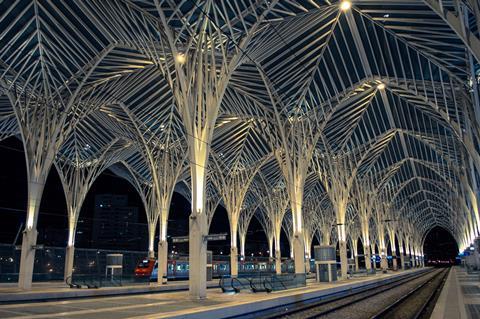
PORTUGAL: Bus and coach group Barraqueiro has established B-Rail as a subsidiary to run open access passenger train services along the Atlantic corridor linking cities in the north and south of the country as part of an integrated multi-modal transport strategy.
B-Rail has applied to national safety authority the Mobility & Transport Institute for an operating licence and the necessary authorisation. Once this has been obtained, it intends to apply to transport and competition authority AMT for train paths on the Braga – Porto – Aveiro – Coimbra – Lisboa – Faro axis.
Barraqueiro already holds the concession to operate Fertagus suburban services in Lisboa, but wants to develop further rail operations to complement its strong position in the road transport market.
Rail operations would be modelled on the group’s long-distance and international coach operator Rede Expressos. It is looking to provide integrated multi-modal transport, with bus connections from the main stations to serve other cities and regions and integrated tariffs, through ticketing and timetables.
Before awarding any paths regulator ATM is required to verify whether the proposed services would jeopardise the economic balance of incumbent state operator Comboios de Portugal, which holds a public service contract from the national government. According to Barraqueiro, B-Rail does not intent to compete with CP in terms of infrastructure tariffs or for slots, but is looking to make use of paths that are already available.
B-Rail is planning to operate 12 daily services each way between Lisboa and Porto, of which two would run through from Lisboa to Faro and three from Porto to Braga. The target journey time between Lisboa Oriente and Porto Campanhã is 2 h 30 m without intermediate stops, although some trains would call at Coimbra and Aveiro.
The company envisages a fleet of 10 trainsets suitable for high speed operation, although it has not yet decided whether these should be purchase or leased. Barraqueiro is currently looking for partners to join the B-Rail project, which it suggests could expand to other parts of the network and potentially into Spain. Establishment of the new business is expected to create between 80 and 100 direct jobs, with more in the second phase.
As well as operating Fertagus since 1997, Barraqueiro has developed its rail expertise through the Metro do Sul do Tejo and Metro do Porto operating concessions. The group also has transport subsidiaries in Brazil and Angola, employing around 9 000 staff in total. It has a combined fleet of more than 4 500 vehicles operating both passenger and freight services by road, rail and water, travelling more than 200 million vehicle-km and carrying more 300 million passengers per year.

















